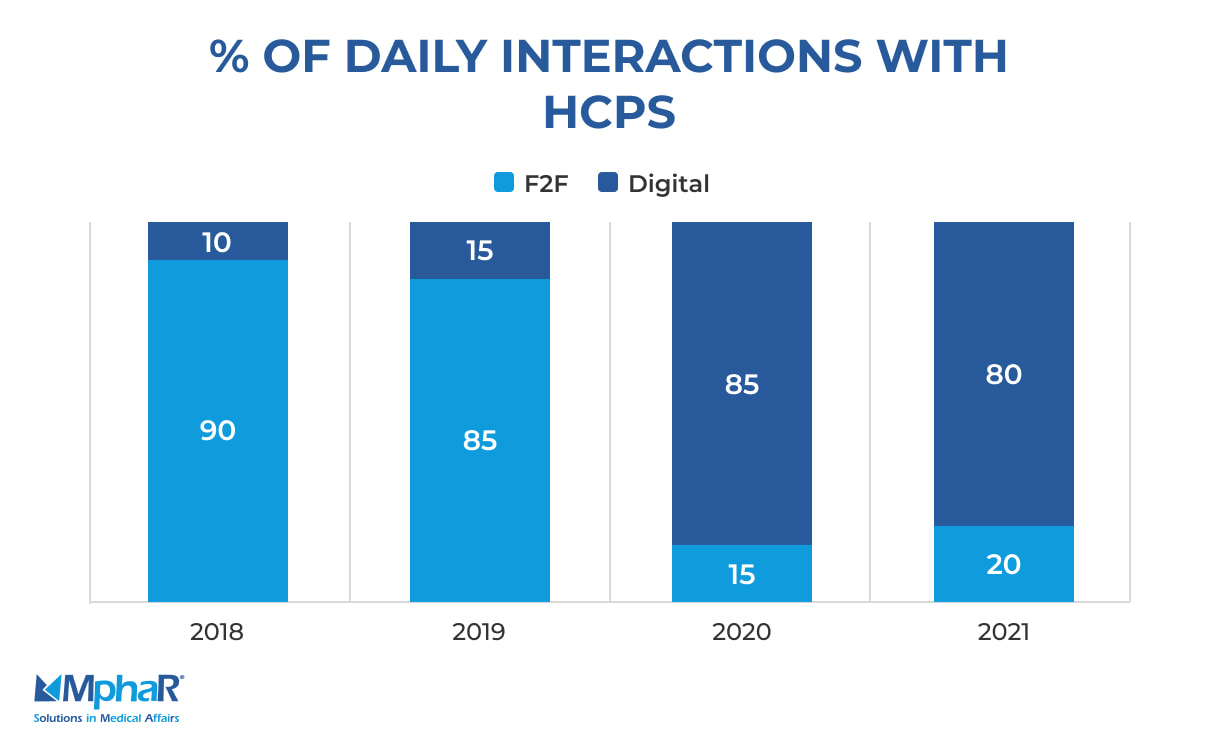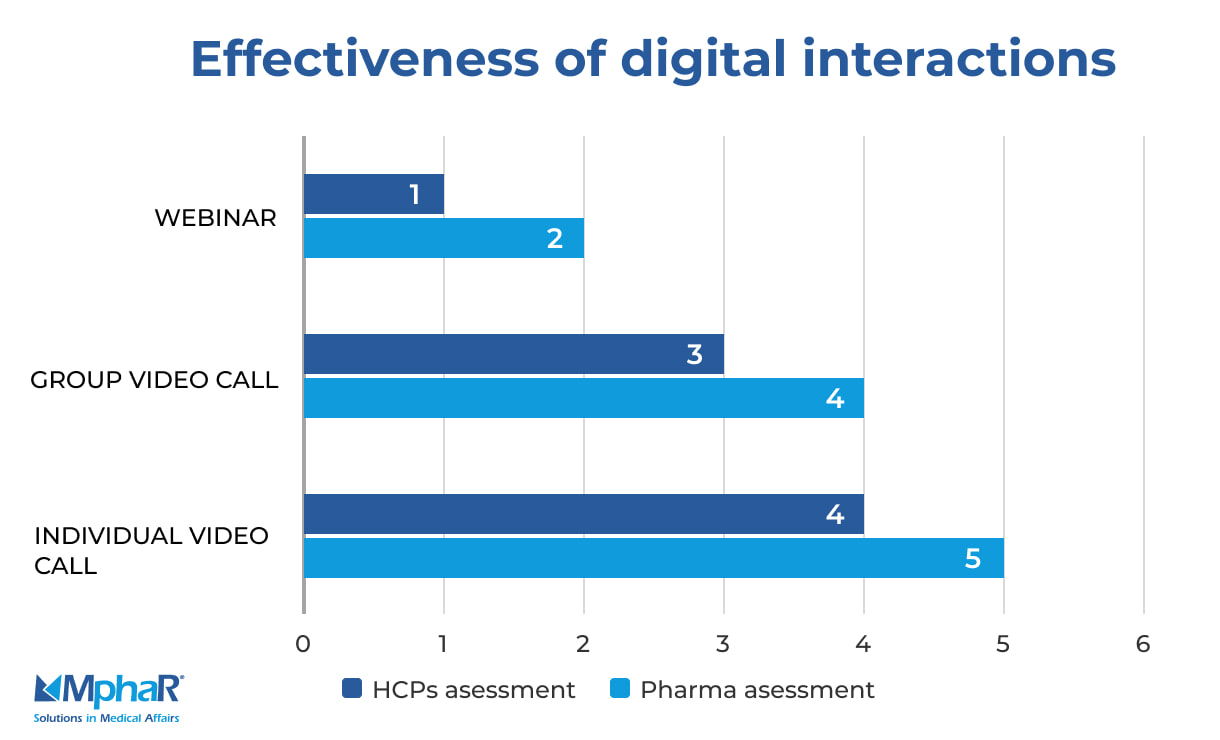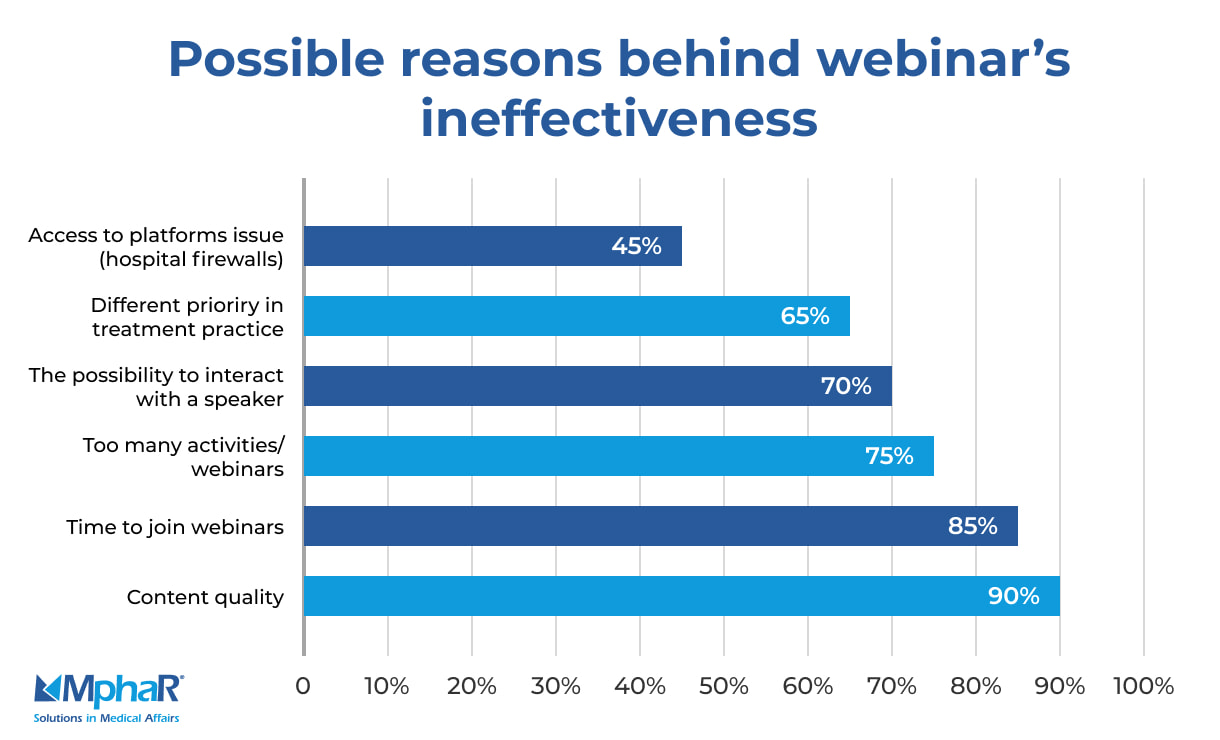Digital interactions with HCPs — moving from Webinars to a more interactive communication tool: a new normal for Pharma Industry

Author: Natalia Denisova, PhD
VP, Head of Medical Affairs, MphaR
The last 2 years have changed nearly every aspect of our lives, and communication is one of the elements receiving a thorough revamp. The pharmaceutical industry has also perceived the evolution of communication channels with a dynamic exposure to digital technologies.
Medical Affairs — a cornerstone of any pharmaceutical organization — offer scientific support by communicating medical information to healthcare professionals (HCPs). The COVID19-pandemic-led decline of face-to-face (F2F) interactions urged the pharma professionals to alter their stances and adjust the medical affairs practice.
Daily interactions with HCPs are evolving
Our recent survey[1], involving 315 HCPs and 286 pharma professionals, reflected the drastic change in the pharmaceutical industry. In the pre-pandemic time (2018-2019), F2F interactions were still the preferred channel for daily interactions with the HCPs (F2F, 90% in 2018; 85% in 2019). The last two years have completely transformed the scenario, with most of the interactions taking place on digital platforms (digital interaction, 85% in 2020; 80% in 2021 – Figure 1).

1 MphaR survey, December 2021. 315 HCPs and 286 pharma professionals
What was the preferred digital format for the daily interaction?
As the tools to interact with the HCPs, the pharma industry has hitherto employed these options:
- Webinars – Webinars (web seminars) are video presentations, workshops, or lectures hosted online, usually via webinar software or other digital platforms.
- Group video calls – a group of professionals attend a video-conference call via video-calling apps and platforms.
- Individual video calls – personalized video-conference enabling one-to-one interactions.
To understand their preferences, we asked the HCPs and the pharma professionals about the quality and effectiveness of the above employed digital channels.
Quality of digital interaction:
In general, individual video calls are preferred compared to webinars or group video calls. In all responses, the HCPs and pharma professionals differed in choosing the degree of quality (from a scale of 1-6; where 1=least quality and 6=highest quality). For instance, the pharma professionals deem individual video calls to provide the best quality of interaction, but the HCPs showed a moderate inclination.
The pharma professionals categorized the group or individual video calls as the highest form of interaction in terms of quality.

1 MphaR survey, December 2021. 315 HCPs and 286 pharma professionals
Effectiveness of digital interaction:
A similar pattern of responses is observed – with individual video calls dominating the list of the most effective communication tools. When effectiveness is concerned, both surveyed populations marked individual video calls as a better form compared to group video calls or webinars. Although considered moderately effective by the HCPs, group video calls are highly acknowledged by the pharma professionals.

1 MphaR survey, December 2021. 315 HCPs and 286 pharma professionals
Why were webinars found ineffective?

1 MphaR survey, December 2021. 315 HCPs and 286 pharma professionals
Most of the responders think (90%) the quality of content is critical – substandard content could easily devalue a webinar. With the busy professional lives, the responders also believe they now have less time to attend webinars (85% of the professionals). The increasing number of webinars (75% of the professionals) topple their usefulness. The inability to interact with the speaker (70% of the responders) could also reduce a webinar’s worth. Moreover, different priorities in treatment practices (e.g., the pharma industry in the US vs EU) are not efficiently echoed in a global webinar – eventually damaging the webinar’s potential (65% of the responders). Lastly, 45% of the survey takers mentioned about the technical challenges to accessing webinar platforms (e.g., hospital firewalls) to be playing a part.
What do the HCPs expect from the digital interactions?
The HCPs are looking for individualized technical solutions to specific problems they face. A personalized approach to decipher the solutions rather than broader troubleshooting is appreciated.
Interactive platforms are respected where the HCPs could effortlessly interact and learn from each other’s journeys. The provision to ask questions in real-time could also enhance their experience.
To respect their busy schedule, the digital platforms should provide ample time for the HCPs to access the content. Without the time pressure, the HCPs could interact productively and efficiently on their own time.
Digital Platforms utilized by the Pharma Industry: the new normal
Even though the responders differed in their answers – the bottom line is clear, webinars are indicated as an ineffective tool of interaction. To bolster the daily interactions with the HCPs, the pharma industry needs to rethink and offer a digital, more targeted, and efficient way of communication.
A leap from the traditional ineffective webinars to the ever-evolving interactive platforms is expected in 2022 and beyond. The platforms should offer the HCPs to exchange their opinions and participate in discussions (both real-time and on their own terms) to brainstorm and generate new ideas.
The flexibility this novel digital platform could offer and the ability to change itself in a customer-centric way will be the tickets to success.
The first who discovers the best way of such interactions might win the race!




